Summer Internships ‘Open Many Doors’ for Trinity Students
Whether in Connecticut, California, or Kenya, Trinity College students are spending the summer exploring their passions and potential career paths at impactful internships.
This year, the College worked with about 125 students to secure academic credit and funding for experiences around the globe.
Trinity’s Career and Life Design Center and Center for Academic and Experiential Advising work with students earning credit for their co-curricular experiences under the new Trinity Plus Curriculum. Additionally, students are eligible for funding from several resources. The Weingarten Cross-Cultural Internship Fund provides support for enriching cross-cultural experiences and the Catalyst Summer Internship Fund helps students gain professional experience and develop industry-related skills.
Hear from some of this summer’s interns.
Juan Rayo ’27 – Administrative and programs intern at the Congressional Hispanic Leadership Institute in Washington, D.C.

Major: Political Science
Hometown: Atlanta, Georgia
Internship Duties: Assist in CHLI’s office operations, including the logistical and administrative tasks to ensure the success of programs such as the annual Future Leaders Conference, attended by 100 interns and young professionals in Washington, D.C.
What is the best part of your summer internship?
The opportunity to expand my network exponentially through meeting so many CHLI alumni, partners, and corporate sponsors. It has also been amazing to visit Congressional offices in both the U.S. House and Senate buildings, meet former and current members of Congress—among them the first Latina ever elected to Congress and current CHLI chairwoman, Ileana Ros-Lehtinen—and visit the corporate offices of major companies and meet with their lawyers and lobbyists.
How does your internship connect with your studies at Trinity?
At CHLI, I am getting the hands-on experience researching and working on projects and events that empower the Latino community in America, in addition to promoting our economic progress. CHLI works directly in both political science and Hispanic studies, which are my two greatest areas of interest at Trinity.
How do you think it may benefit your educational or career path?
Interning at CHLI and living in D.C. for the summer helped me learn more about the issues that affect the Hispanic community in America. I also had the special opportunity to understand the political culture of the city. As I navigate my career paths, I also had the chance to meet potential mentors—people who have followed paths I am interested in—and be advised directly by them. I am going back to Trinity with invaluable lessons learned, an expanded network, and a clearer understanding of certain career paths I might pursue in the future. I would highly recommend applying to these kinds of opportunities, because there is a great reward in expanding your horizons and learning how to progress professionally.
Diarra Sadji ’25 – Sustainability intern at the State of Connecticut Department of Administrative Services (DAS) in Hartford, Connecticut

Major: Environmental Science
Hometowns: Dakar, Senegal; Treviso, Italy
Internship Duties: Participate in multiple sustainability projects to reduce as much as possible the environmental impacts that state agencies, and specifically the Department of Administrative Services, generate.
What is the best part of your summer internship?
How truly multifaceted my experience has been. I was able to be involved in many projects that are related to a wide range of expertise, and it was satisfying to learn about so many things. The projects included the creation of a statewide organic waste diversion program, in which all state agencies are encouraged to compost their food waste. I have also been involved in the redaction of the DAS legislative summary from the last legislative session and evaluating DAS sustainability efforts to identify opportunities for improvement. I have also attended meetings on the HVAC decarbonization study that the state is conducting and worked with construction experts to make sure that DAS high-performance buildings are in compliance with the International Green Construction Code.
How does your internship connect with your studies at Trinity?
The environmental field is very wide, and through my educational journey, I have been able to mainly focus on the scientific aspect of environmental issues. I am grateful that my summer internship allowed me to explore the more bureaucratic and practical side of environmental issues.
How do you think it may benefit your educational or career path?
It was very important for me to be exposed to the different aspects of a sustainability career, to truly know what I would like to do in the future. I frankly cannot say that I have my career path all figured out, but I found it so valuable to work with devoted people who invest all their efforts to reduce the environmental impact of Connecticut. The skills I have gained through this internship are immeasurable and these skills will help me, no matter where life brings me.
Janna El Ashmawy ’25 – Assistant guide at Ithaca Montessori School in Ithaca, New York
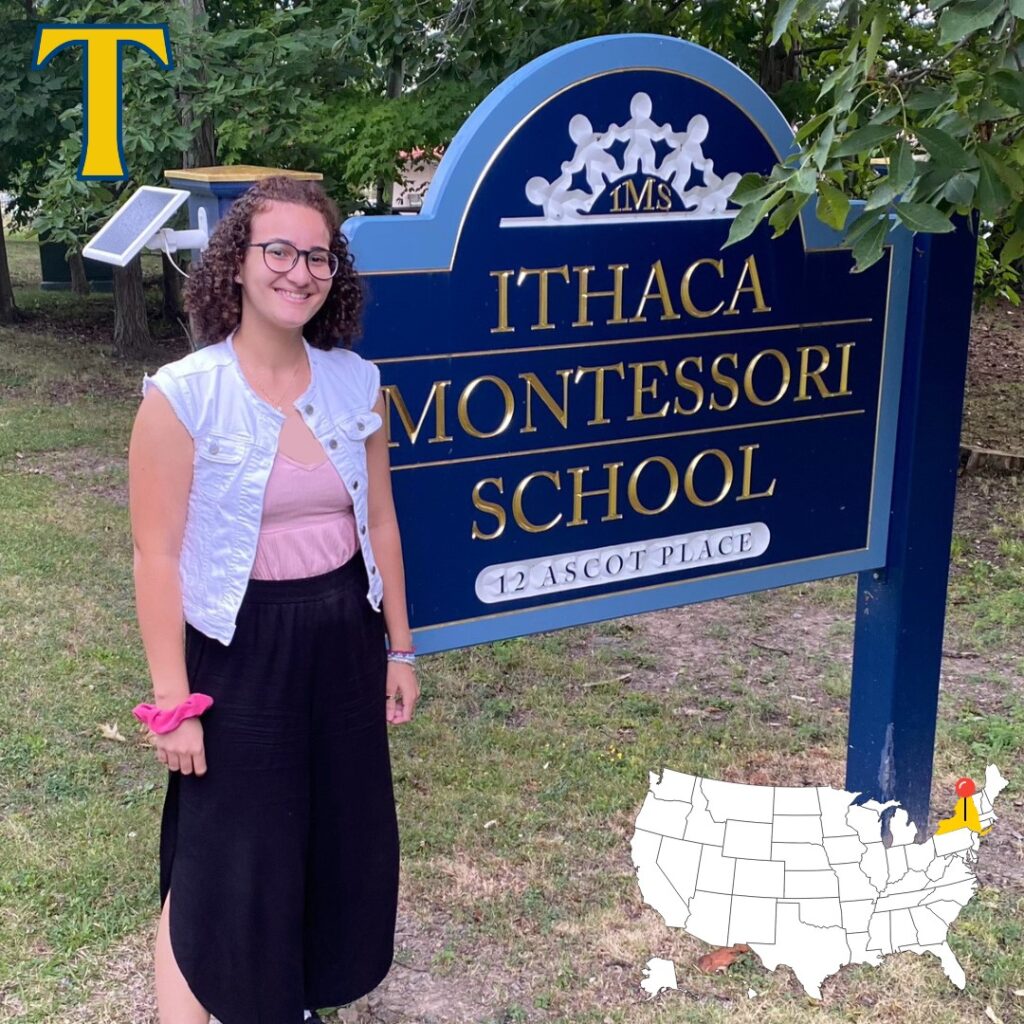
Major; Minor: Psychology; Cognitive Science
Hometown: Alexandria, Egypt
Internship Duties: Gain an understanding of Montessori philosophy through training, mentoring, and the application of skills and knowledge acquired through this process; observe and record pertinent information about the areas of development for each child and share with the classroom team and lead guide; support the children in material and behavioral choices.
What is the best part of your summer internship?
The opportunity to gain hands-on experience working directly with toddlers at a Montessori school. This practical exposure has significantly enriched my understanding of child development. One of the most valuable aspects of the internship was shadowing different occupational therapists. Observing their techniques and learning how they tailor their approaches to support each child’s unique needs has been incredibly insightful. It has given me a deeper appreciation for the role of occupational therapy in early childhood education and development.
How does your internship connect with your studies at Trinity?
As a psychology major and cognitive science minor, immersing myself in the Montessori educational approach has been eye-opening. Witnessing how children thrive in an environment that encourages independence and self-directed learning has been fascinating. I’ve learned so much about creating nurturing and supportive learning environments that cater to individual developmental stages.
How do you think it may benefit your educational or career path?
This internship has not only enhanced my academic knowledge but also contributed to my personal growth. I’ve developed better communication skills, increased patience, and a stronger ability to connect with young children. This experience has solidified my passion for working in child development and has provided me with a solid foundation for my future career.
Owen Myers ’27 – Intern at Stanford Life Design Lab at Stanford University in Palo Alto, California
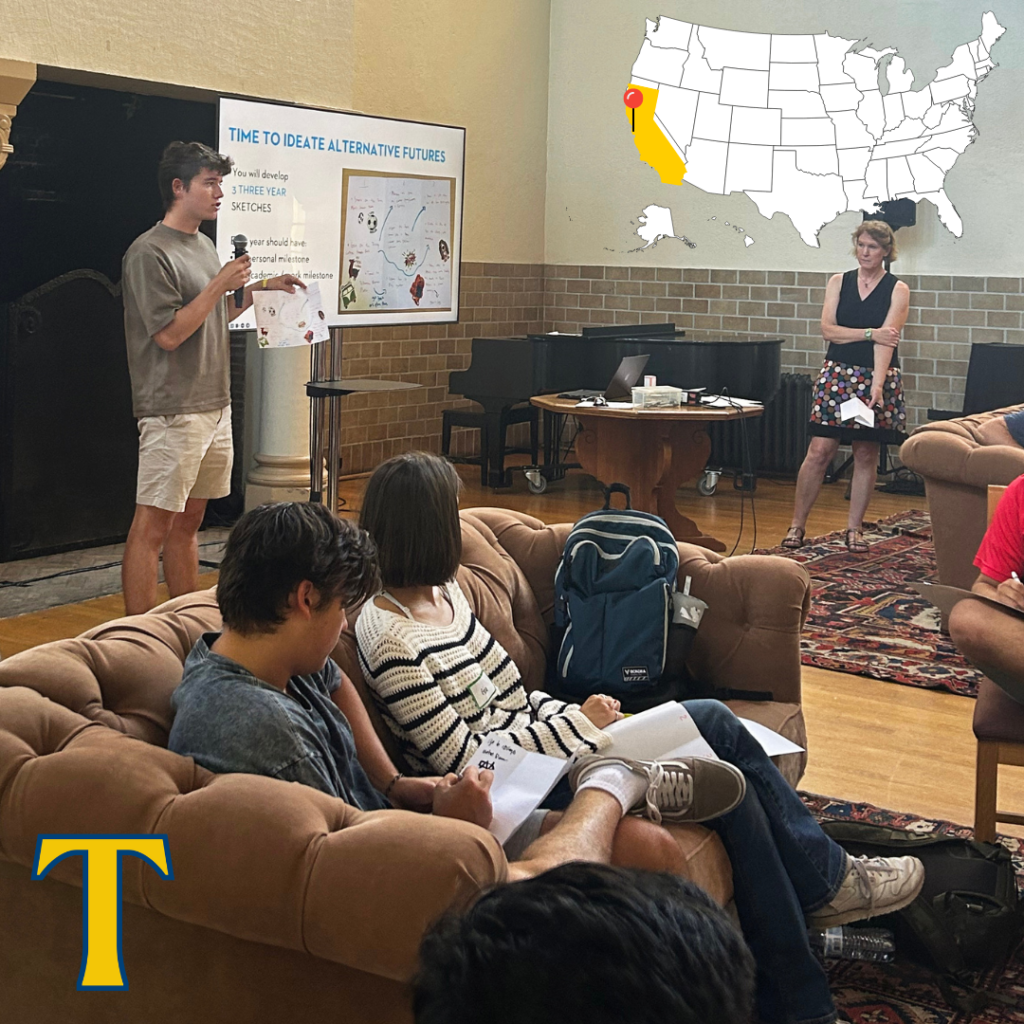
Desired Major; Minor: Economics; Applied Mathematics
Hometown: Boston, Massachusetts
Internship Duties: Work with faculty from various collegiate institutions and professionals from corporate firms via conferences, studios, and meetings to explore how a life design curriculum can be effectively incorporated into their environments.
What is the best part of your summer internship?
I have made connections with many professors and administrators from universities around the world, including Stanford, Dartmouth, Harvard, The Hong Kong University of Science and Technology, and many more. I have met so many interesting people from many different walks of life, and it has been awesome to hear about their experiences.
How does your internship connect with your studies at Trinity?
I am working in the Life Design Lab within the Hasso Plattner Institute of Design (d.school) at Stanford. The base curriculum that the lab works off of is one that I learned in my First-Year Seminar, “Design Your Future Work,” taught by Joseph Catrino, Trinity’s executive director of career and life design. I am also an intern in the Career and Life Design Center at Trinity this year, and the many lessons I have learned this summer will help me with that.
How do you think it may benefit your educational or career path?
Life design and life-long learning are tools that the lab is teaching to people who are working through their careers. I have learned skills such as how to find your true passions, what careers fit you as a person, how to transition through careers, and others. I also have learned crucial skills in networking, research, teaching, writing, and collaborating with others. This incredible opportunity would not have been possible without Mr. Catrino’s help connecting me with folks here and the Career and Life Design Center for the Catalyst Summer Internship Fund grant. This internship has opened many doors for me and allowed me to live in a new place and work with people I would have never met otherwise.
Hannah Boone ’26 – Social media coordinator for the Bourne Braves of The Cape Cod Baseball League in Bourne, Massachusetts
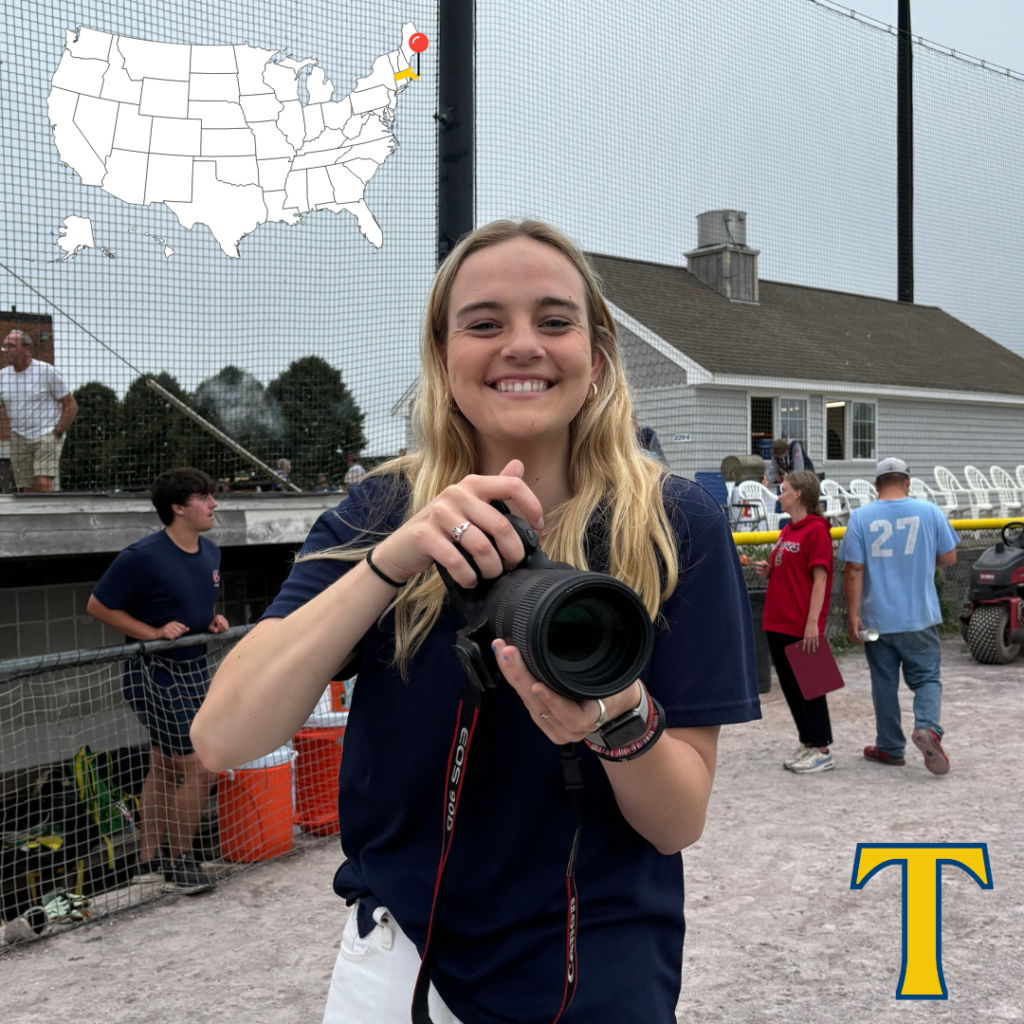
Major; Minor: Sociology; Rhetoric, Writing, and Media Studies
Hometown: Arlington, Virginia
Internship Duties: Collaborate closely with the media team of writers, photographers, and videographers to produce content for all Bourne Braves social media channels.
What is the best part of your summer internship?
The hands-on experience of creating engaging social media content in real time during games. The thrill of capturing key moments and getting a front-row seat to them has been incredibly rewarding. Additionally, the opportunity to interact with other interns has been profoundly rewarding and such a great learning environment. It is gratifying to know that my work enhances the experiences of others and fosters a stronger connection between the team and those who follow.
How does your internship connect with your studies at Trinity?
This internship allows me to apply sociological theories and communication skills to real-world scenarios. It bridges the gap between academic concepts and practical application in a dynamic sports environment. My motivation for pursuing this internship stems from my passion for sports and my desire to learn how to effectively share that passion with a broader audience.
How do you think it may benefit your educational or career path?
This summer, I’ve gained valuable experience in social media management, content creation, and marketing, which are crucial skills for my desired career in sports communication. It also offers networking opportunities and insights into the sports industry, enhancing both my professional development and future job prospects. I’ve had the chance to merge my passion for sports with my academic interests. This has solidified my career aspirations and motivated me to continue pursuing opportunities in sports media and communication. I believe that sports have the power to bring people together and create a sense of community, and I want to be part of the process that amplifies this power through digital media.
Amina Farah ’25 – Somali Giraffe Project intern at the Hirola Conservation Program in Kenya
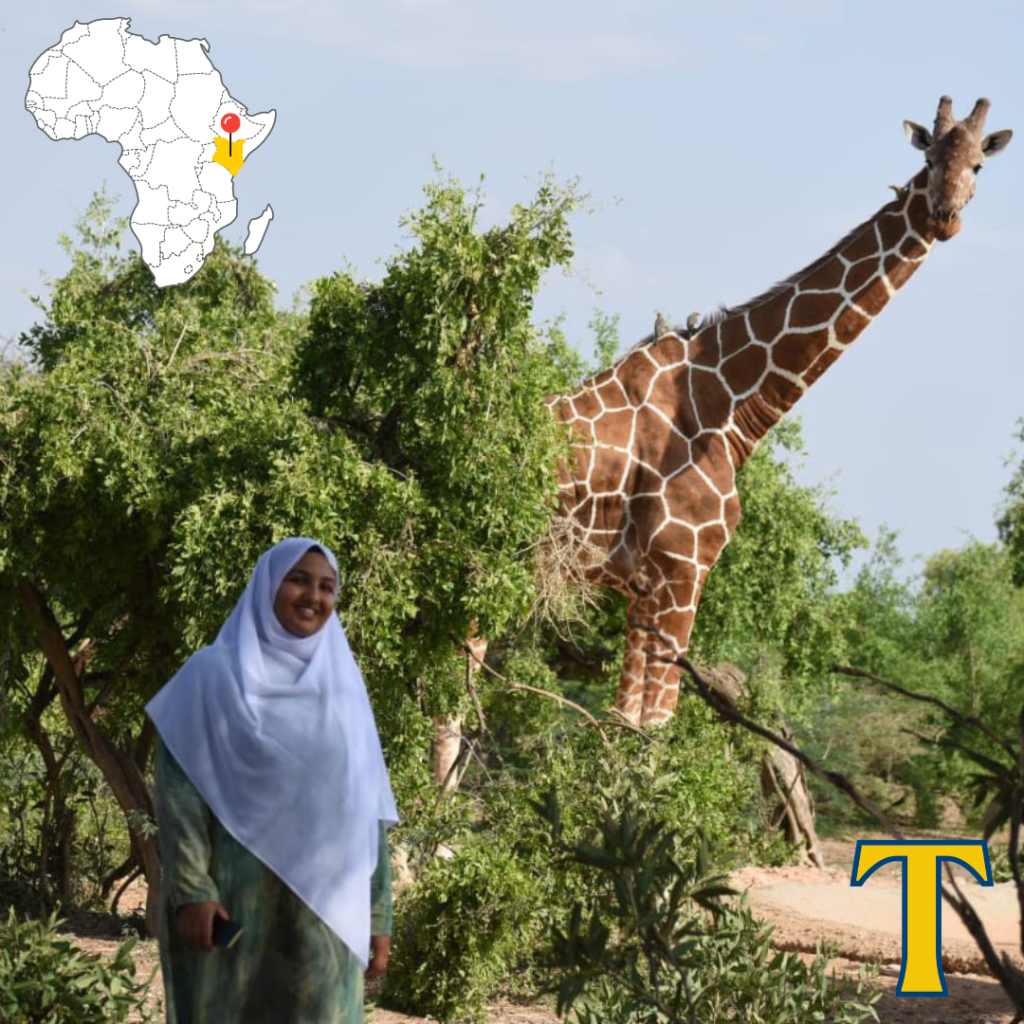
Major: Environmental Science
Hometown: Calgary, Alberta, Canada
Internship Duties: Assist an ongoing research project involving the encroachment of giraffe water access corridors. The field work includes mapping out corridors, administering questionnaires to community members, and conducting key informant interviews with local stakeholders.
What is the best part of your summer internship?
The most rewarding part of the experience is having the opportunity to visit local primary schools in the area and speak to kids about wildlife conservation. They are so eager to learn, and I always learn so much myself. We also have student groups come visit us at the giraffe center. Watching a student see a giraffe for the first time never gets old.
How does your internship connect with your studies at Trinity?
At Trinity I have been studying environmental science, with a particular interest in wildlife biology. This internship has been an opportunity to dive into my field and start trying to tackle some of the environmental issues I have been studying. I have been able to take what I have learned in the classroom and build upon it as I participate in research and implement conservation efforts.
How do you think it may benefit your educational or career path?
This internship is definitely a catalyst for my goal of pursuing a career in wildlife conservation. During my spring semester studying abroad in Kenya and this experience, I have cultivated new skills and gained invaluable research experience. I built confidence as a researcher, have seen the inner workings of a homegrown conservation NGO, and made connections with researchers and other organizations in the region. I got the internship by reaching out to the director of the organization after receiving his contact from someone I met in the field. I would encourage other students to reach out to anyone doing the kind of work you want to do, because you never know. I would also like to give a big thank you to the Weingarten Cross-Cultural Internship Fund, which is supporting me throughout my internship.
Maliah Ryan ’25 – Field ecology intern at Yale-Myers Forest, Yale University, in Eastford, Connecticut
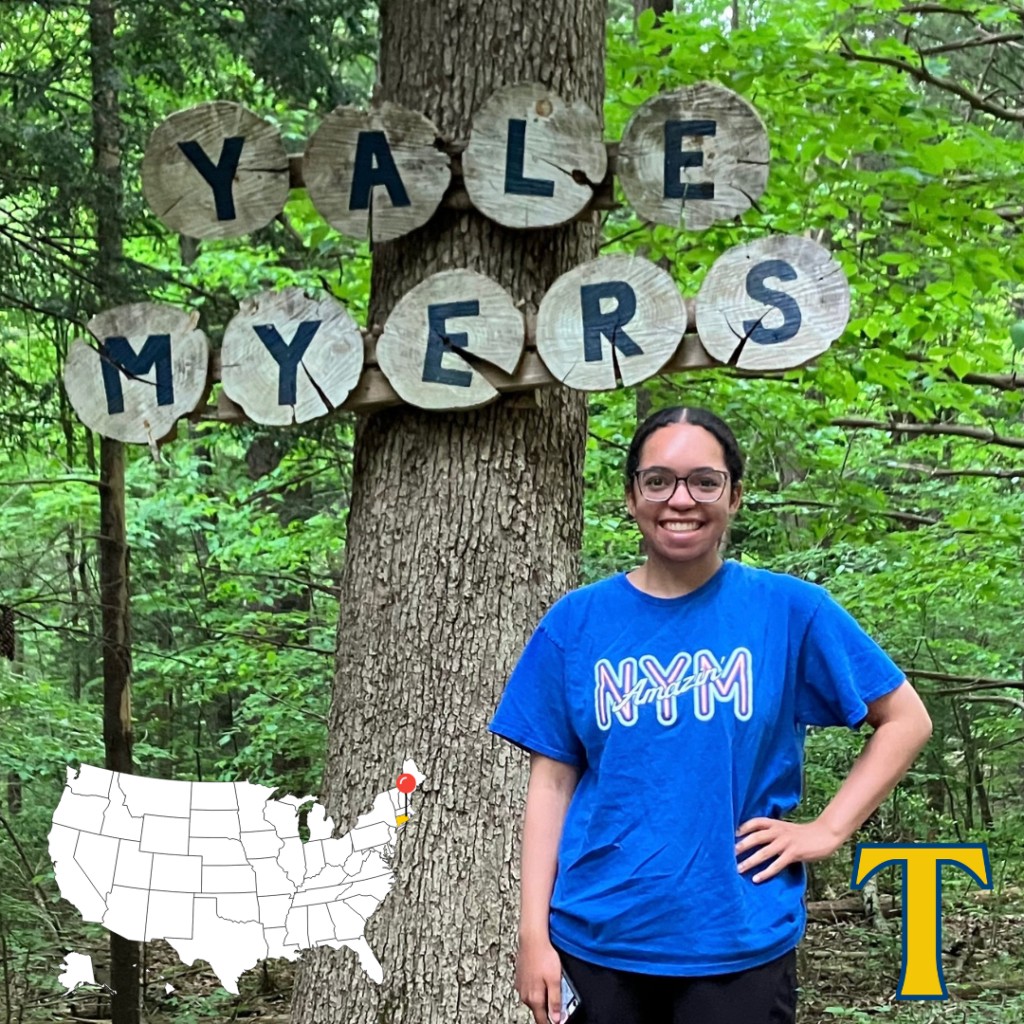
Major; Minor: Environmental Science; Biology
Hometown: Southington, Connecticut
Internship Duties: Take various ecological measurements at different forest stands under the supervision of Yale professors Mark Ashton and Marlyse Duguid, focusing on two long-term projects within the Silviculture Lab that study the influence of environment and land use on ecological communities.
What is the best part of your summer internship?
Forming meaningful connections. Yale-Myers was composed of individuals from various stages in their academic and professional journeys, including undergraduates, master’s students, Ph.D. candidates, researchers, and the forest crew. I really appreciated how welcoming the environment was for new interns. I had the privilege of working in a tight-knit setting that allowed me to grow closer to colleagues whose lives and experiences spanned across the country and the globe.
How does your internship connect with your studies at Trinity?
This internship allowed me to apply theoretical knowledge from Trinity to practical fieldwork, particularly in areas like identifying tree species, measuring seedlings and trees, and analyzing ecological data. I took a forest ecology and management class at Trinity last spring with Eureka Joshi [the Thomas McKenna Meredith ’48 Postdoctoral Fellow in Environmental Science], and many of the silviculture and sustainable management topics from the course came up during my internship. Other classes, such as those on biology, environmental chemistry, and earth science also prepared me well for this experience.
How do you think it may benefit your educational or career path?
The internship was pivotal in shaping my educational and career trajectory in environmental science. In addition to building professional relationships and improving my communication skills, this internship provided me with hands-on experience in fieldwork for the first time. Working alongside experienced professors and engaging in long-term ecological studies broadened my understanding of sustainable forestry management practices.
Fun facts: My favorite tree is musclewood. My least favorite plant is mountain laurel.
B D S Aritra ’25 – Corporate technology summer analyst at Jefferies LLC in Jersey City, New Jersey

Major; Minor: Computer Science; Applied Mathematics
Hometown: Dhaka, Bangladesh
Internship Duties: Support the trade settlement process and various aspects of corporate finance; build a full-stack web application that displays trade settlement jobs.
What is the best part of your summer internship?
I’ve had the opportunity to network with business leaders. Working on real-life projects with the operations team has helped me understand the intersection between finance and technology. My research in math and machine learning at Trinity—including a project with NASA—has significantly boosted my confidence in my abilities as a software/machine learning engineer. I have learned that failures are opportunities for growth and that remaining humble during successful times is essential. Another key takeaway is that attention is currency, and we should not neglect the power of attention.
How does your internship connect with your studies at Trinity?
The “Cloud Native” class I took at Trinity, where I learned to build full-stack web applications, directly prepared me for my current role. Additionally, my role as a research assistant at NASA, focusing on detecting anomalies in solar observations, provided me with the skills necessary to approach complex problems and implement effective solutions. While studying abroad at Queen Mary in London, I took a database class that enhanced my understanding of data management and storage solutions. And the support and motivation I received from my professors at Trinity have been crucial in my ability to adapt to the fast-paced environment at Jefferies and contribute meaningfully to the team.
How do you think it may benefit your educational or career path?
I aspire to be a software/machine learning engineer, and my experiences at both Trinity and Jefferies have equipped me with the essential skills needed to succeed in the ever-evolving tech industry. Trinity has provided a strong academic foundation and hands-on experience, while Jefferies has offered practical, real-world application of those skills. I aim to leverage these experiences to contribute to and drive innovation in the tech world, staying ahead of upcoming changes and making a meaningful impact.
Orly Perez Frid ’26 – Summer Undergraduate Research Fellow (SURF) at Mayo Clinic Graduate School of Biomedical Sciences in Rochester, Minnesota
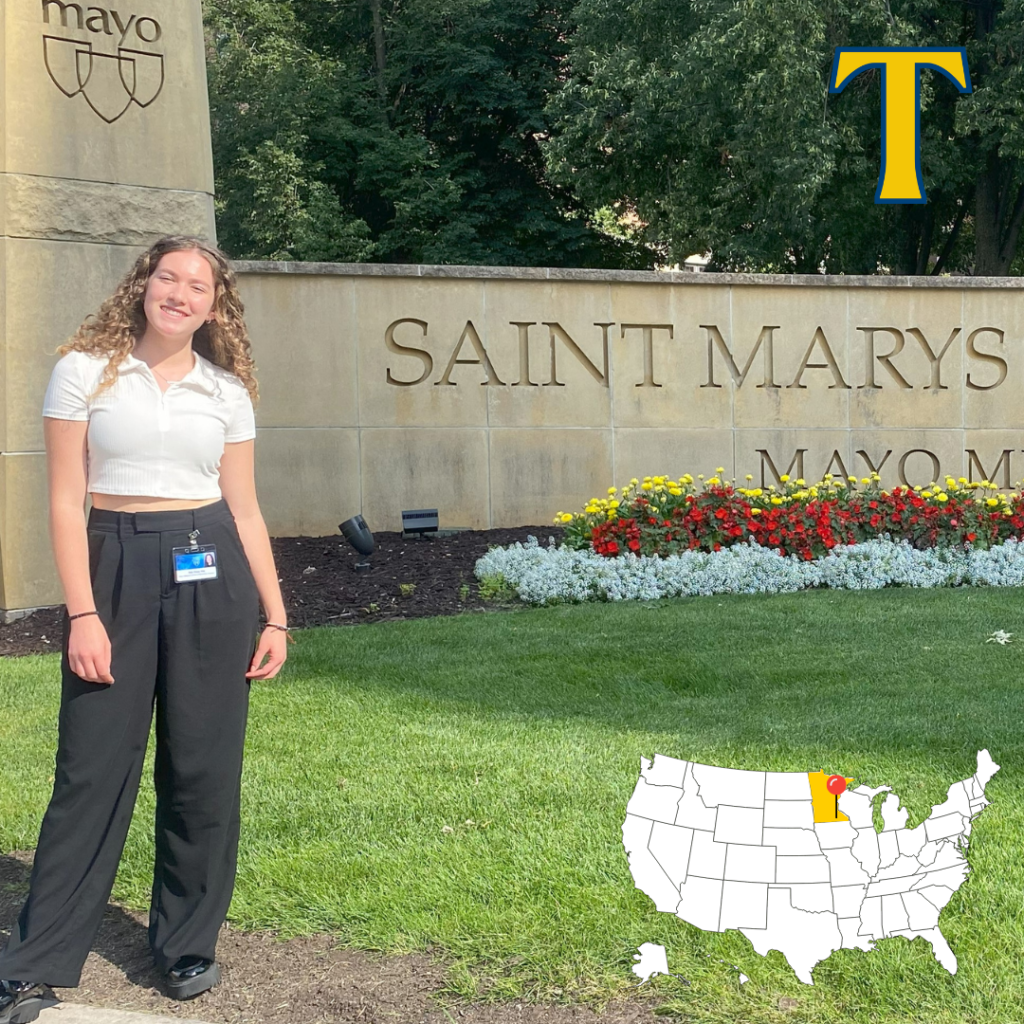
Majors: Neuroscience and English
Hometown: Mexico City, Mexico
Internship Duties: Conduct research in a computational neuroscience lab that focuses on epilepsy; process and analyze data; code and build integrative system models.
What is the best part of your summer internship?
The opportunity to learn new skills thanks to the mentorship of fellow researchers and scientists. From basic programming and integrative system modeling in different software, to conducting EEGs and analyzing the data, to leading my own research project, I’ve been working with amazing people from all over the world who are always willing to help. I’m really grateful for all the opportunities and connections this internship has opened for me.
How does your internship connect with your studies at Trinity?
This has given me the opportunity to explore a new aspect of the neuroscience world—the computational and engineering-based side. I’ve been able to apply the knowledge I have gained at Trinity to my project, and I’m sure I will take what I have learned here back to Trinity. This internship directly correlates with my major and supports my future goal, which is to pursue a Ph.D. in neuroscience.
How do you think it may benefit your educational or career path?
Nowadays, the best way to further a career, especially a research-based one, is by gaining experience, which is exactly what I’m doing. Not only am I conducting my own research project, which I will present at a research symposium, but I have also learned hard and soft skills that are helping me become a well-rounded scientist and a better candidate for grad school. Working as a full-time researcher at the Mayo Clinic has given me a glimpse of what my future might look like, allowing me to utilize technology and techniques that I had never worked with before and providing a chance to collaborate with Ph.D. students, professors, PIs, researchers, fellows, postdocs, and doctors from different disciplines.
Metasebia Habtegiorgis ’25 – Software engineer intern at Microsoft in Redmond, Washington
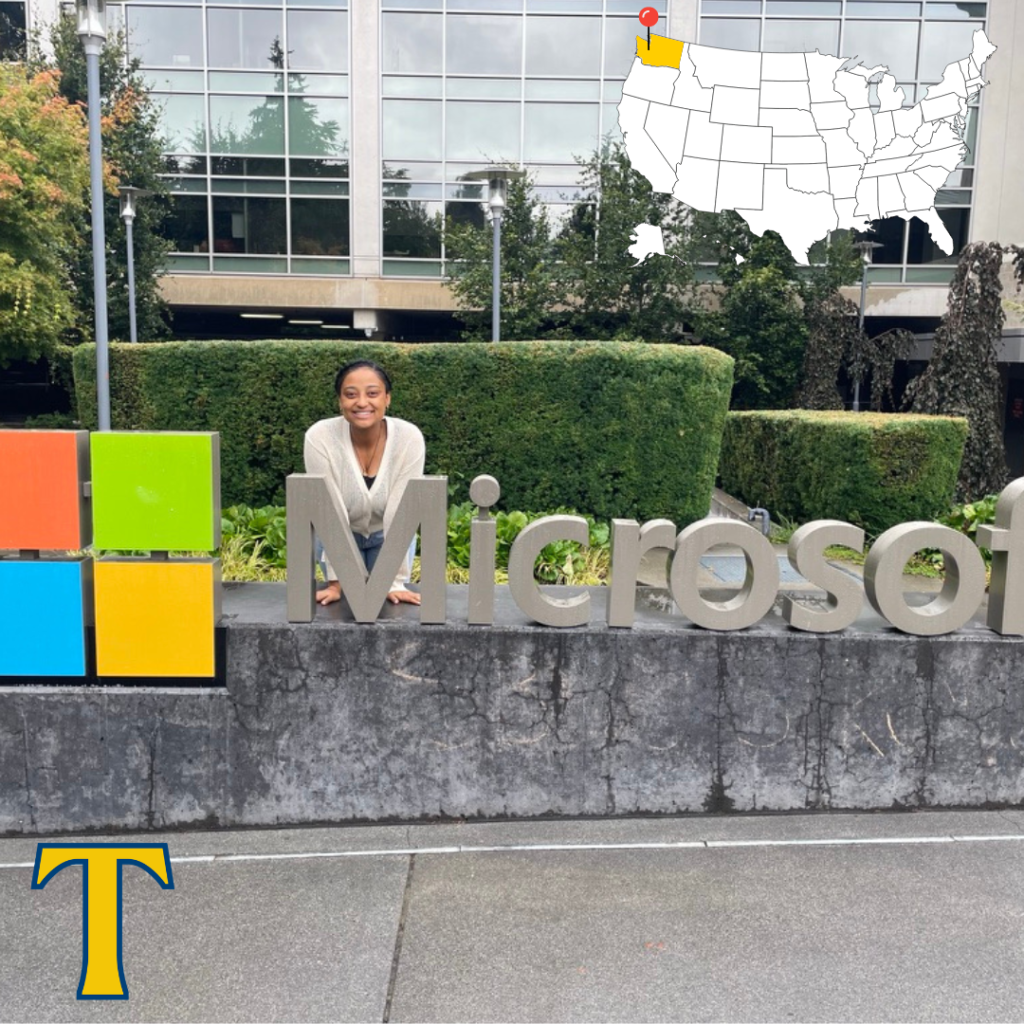
Major: Computer Science
Hometown: Mbabane, eSwatini
Internship Duties: Apply engineering principles to solve complex problems through sound and creative engineering; learn new engineering methods and incorporate them into work processes.
What is the best part of your summer internship?
The best part of my summer internship experience at Microsoft has been the incredible collaboration with my team and the opportunity to learn about the industry and its best practices. I have made many new friends and found a supportive community that has enriched both my personal and professional life. This experience has helped me grow as an engineer and discover my true passion for the field. Additionally, spending the summer in Seattle, one of the most beautiful places I have ever been to, has been a wonderful bonus.
How does your internship connect with your studies at Trinity?
This closely aligns with my studies by allowing me to apply theoretical knowledge from my computer science coursework to a real-world project. It enhances my skills in programming, problem-solving, and analytical thinking through hands-on experience with cutting-edge technologies. The internship also provides exposure to industry best practices and professional workflows, complementing my academic learning. Additionally, it offers valuable networking opportunities with industry professionals and aligns with my career aspirations in software engineering, better preparing me for a successful career in the tech industry.
How do you think it may benefit your educational or career path?
This internship provides hands-on experience with advanced technologies, enhancing my practical skills, and bridging the gap between academic theory and industry practice. Additionally, the opportunity to network with experienced professionals and fellow interns will open doors for future collaborations and career opportunities. This experience will also give me a clearer direction for my career aspirations, ensuring I am better prepared for the challenges and opportunities in the tech industry.
